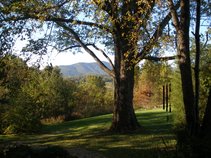An opal pendant necklace lay on the lace doily on top of Birdie’s makeup table. She touched it absently as she stared in the mirror at the aging woman with a thin face, wispy white permed hair, and eyes the color of a monks cowl. Starburst wrinkles radiated out from her brittle lips. She looked as if she had been sucking tailpipes for decades.
Birdie pulled a Salem out of the pack and lit it, inhaling deeply, and exhaled as she plucked it out between long bony fingers stained caffeine brown. The smoke wafted up into a small but tidy bedroom with dresser drawers, an easy chair, a small closet, and one window looking out over a puddled street below. The sky was clearing after a cold front’s lashing rain had passed during the night, the winds now gusty, pushing fair weather cumulus briskly across the cerulean sky and clattering the grimy steel shutters of the closed storefronts across the way.
Today was Monday, and the bar was closed. Birdie had woken up at her usual hour, 11am, had bathed and put on simple gray slacks and a blue silk blouse. Last night’s trade was slow, even for a Sunday.
Birdie picked up the pendant. The large fire opal gleamed in its silver setting, its deep yellows and oranges and reds flickering in the daylight. Roddy had picked it up for her in Perth during one of his stints as an engineer on the MV Tysla, a 75000 ton Maltese flagged vehicle carrier.
Birdie had first met Roddy when he was on shore leave in Brooklyn. She was a bartender/server at Sammy’s, a watering hole in Red Hook near the Brooklyn Marine Terminal. Birdie was a young woman on the rise, interested in the hospitality business with a GED that she hoped to upgrade to a BA at CUNY. Attractive, thin, brunette, she drew appreciative gazes, not leers, from the men she served. She had a dignity in her presence, in her bearing, in her alert eyes that men seemed to respect. But some fools are always rude.
Roddy had come in alone to have some late lunch. The restaurant was mostly empty, so he sat at the bar and ordered a Coke and a sandwich from Birdie. Roddy was a small man with gentle, mirthful green eyes, a crooked, endearing smile, and a shock of unruly red hair in a Jughead cut. He wore denim from neck to ankles, heavy black brogans, and a knit cap. Birdie had seen many sailors come and go in her work along the waterfront, and sailors are sailors. But there was something about this sailor, this man, that intrigued her, even comforted her. It was his mirth that she had sensed, had drawn her to him like a pheromone. Birdie understood that many years later.
She put Roddy’s order into the kitchen, and brought him his Coke.
“Your order should be ready in just a few,” she said. “Kind of quiet today.”
“Thanks,” said Roddy, smiling politely.
Normally Birdie would have turned away and left him alone until his sandwich was ready to bring out, but instead she paused and held his gaze.
“When do you need to be back at the ship?”
He cocked his head, and grinned.
“That obvious, huh?”
“Well, yeah…” she replied with a chuckle.
“Well, yeah…” she replied with a chuckle.
“Eight bells, last dog,” said Roddy casually, watching her reaction, testing her, sensing something.
Birdie looked at the clock above the entrance.
“Well, that gives you about five and half hours to kill, and my shift ends in a half hour. Ever been to Governor’s Island?”
They married six months later. Roddy had returned from Australia with the opal, a diamond ring, and a fistful of letters that Birdie had posted to him while he was gone. To stay closer Roddy had become a “coastie” working tugs and supply ships servicing oil rigs. He was away from Birdie no more than a week or so at a time. She finally got her BA from Stonybrook in hospitality management. Good times. Young couple. Bright future. They shared joy and accomplishment, but mostly mirth, a state of mind.
Then a nor’easter roared up the coast almost two years to the day after they were wed. Roddy’s supply ship got caught in the brunt of it, lost an engine and broached sideways in 100 foot seas…at about eight bells, last dog according to their final transmission received. Roddy certainly would haveh been below decks working on the engine when the ship went down, and Birdie still can’t stop the nightmares of Roddy's final moments when the ship rolled, the lights flickering out with a last image of terrified shipmates, eyes bulging in fear and screams overwhelmed by shrieking wind and pounding seas as the black, cold water took their last breath away.
Mirth beams and enfolds, it softens and uplifts, soothes the edges and freshens the moldiest of minds. It’s a gift readily given by those who hold it. And when it goes away, for some it lives on as a powerful memory and brings a smile when thinking of the departed. For others, its absence makes the loss even more painful, even more obvious and enduring.
Birdie last saw Roddy from the window next to her makeup table. It was a beautiful fall morning, unseasonably warm breeze blowing from the south, and the first rays of sun shining. The weather was turning, but it was just a short haul and Roddy would be back. She was leaning out the window, her opal pendant dangling from her neck, the sun on her face, and blew a kiss to Roddy as he came out the front door. He waved, returned the kiss, and shouted, “that little stone just winked at me, but it ain’t as beautiful as you are, doll! See you in a few!” And he had turned and walked down the street.
That was almost forty years ago. Birdie had taken the modest surviving spouse benefits and Roddy’s life insurance proceeds to put a down payment on their brownstone, establish her private quarters upstairs, and gut the first floor to put in a modest cocktail bar called Roddy’s. An old woman before her time, Birdie let her youth slide into middle age and beyond as she faced life, and drunks, and drifters, and suitors, and callow youth equating whiskey sours with sophistication, and wanted only Roddy again. His mirth became her ghost, haunting her, taunting her, a mirror image of its origin. Birdie could only think of what she had lost, and how it had happened. The cold dark sea had extinguished her mirth.
So she tended her bar, employed a gypsy parade of bartenders who too often raided the till, and made a meager living in a smoky room, each night retiring upstairs to see Roddy in her dreams, waving goodbye, calling her “doll,” and drowning alone in a blackness that stole the light from her life.
Birdie looked again at the pendant in her hand, put it to her lips, and kissed it. She opened her jewelry box and gently put it inside. She put on her coat, lit another cigarette, and headed out the door to buy an assorted case of booze for the bar, just another old woman disappearing into self-imposed exile alone amongst the multitudes.

